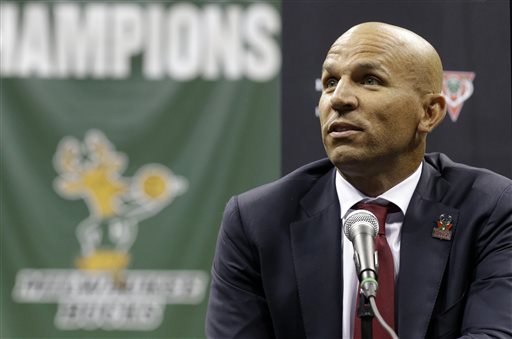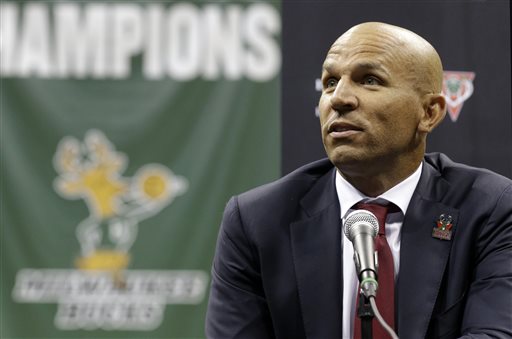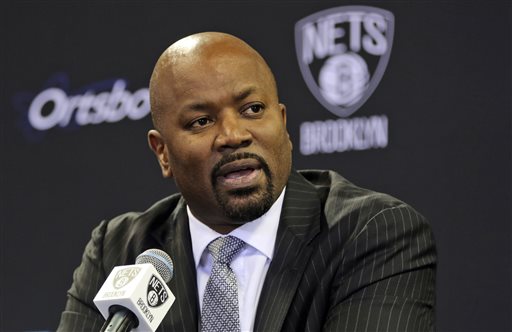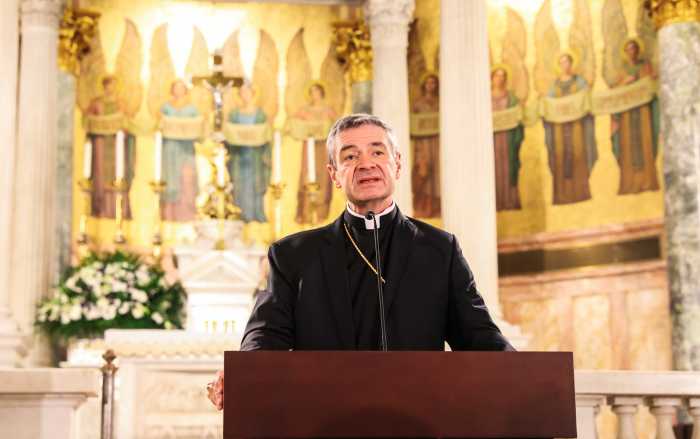
If there were awards given out for self-awareness, Jason Kidd would wonder why he hasn’t won one yet.
The Milwaukee Bucks introduced Kidd as their new head coach Wednesday afternoon at a press conference live-streamed from their arena, after a week of mayhem that began with Kidd trying to usurp Nets general manager Billy King in the team’s front office after one season with the Nets as head coach, and ended with Kidd taking the coaching job held by Larry Drew, who was still under contract.
There’s something to be said about chasing two jobs that were already filled — first your boss, then your equal 1,000 miles away. “This is business,” Kidd said, a smirk creeping across his face. “I think Billy said it best. It’s business. That’s what it comes down to.”
It was incredible to watch, really. Kidd complimented reporters on their questions, using their names (something he’d never done in Brooklyn) before dodging those same questions completely. He refused to say the words “Brooklyn” or “Nets,” and only saying “Billy” (in reference to Nets GM Billy King) once.
He had a chance to cop to his errors, admit that he’d made a clumsy exit, and get ready to move on in a new situation. Instead, he exuded the thoughtfulness and grace of a bull, denying reports that he’d tried to seize more power in Brooklyn after the press conference and showing no remorse for the mess he’d left behind. He could even win back some points if he acknowledged the rationality of his decisions: he wanted a better job, couldn’t get it in Brooklyn, and got it elsewhere. He didn’t. Kidd, already in mid-season press conference form, didn’t say much of anything.
Even Mark Lasry, Kidd’s former financial advisor and part-owner of the Bucks, admitted that the process wasn’t right. The Bucks ownership originally kept the discussions a secret from Bucks GM John Hammond. Hammond, who sat next to Kidd and opened the proceedings, who did not reference Kidd at all in his statement.
“We were asked to keep it confidential, and we did, and I think it was, obviously in retrospect that was a mistake,” Lasry said.
But no such mistakes on Kidd’s part, if you ask the new Bucks coach. He didn’t start it, it was his agent that contacted Milwaukee first. (Sure, but why did he contact Milwaukee in the first place? Did he want restaurant tips?) He didn’t want a basketball ops job, except that’s the only reason he’s in Milwaukee today at all.
“When you look at myself, I’m a coach, and that’s what it’s all about,” Kidd said. Except now he’s coaching in Milwaukee, and many believe the job he covets in the front office isn’t far behind.
This is par for the course for Kidd, who was handed nearly everything in Brooklyn. He got a contract fair for the market at the time it was signed. He got full power to coach a professional basketball team less than two weeks after retiring. He got the staff he wanted, and the power to change it as he saw fit. It actually worked for some time: the Nets were among the league’s best in 2014, thanks to Kidd’s tinkering with the starting lineup and their rotations.
But when he went too far, Kidd didn’t acknowledge it: he took his ball and went to coach Jabari Parker. “No one is perfect and I’ll be the first to admit that,” Kidd added. “It’s about if you make a mistake, being able to own it.” He did not admit to any mistakes.
Near the end of the clumsiness, Kidd was asked what he’d learned in his one season at the helm in Brooklyn, if there was something that he could bring from his one year with the Nets that might help him develop in Milwaukee. He could’ve said developing players, or working with staff, or not spilling sodas so overtly. But Kidd, ever oblivious, gave an answer almost too perfect.
“Patience,” he said.
Yes, patience. The kind of patience that might stop someone from staging an organizational coup after less than 100 games as a head coach. The type of patience that might help someone realize that a presidential position doesn’t come after a 44-38 season and a willingness to pay $50,000 soda fines. The kind of patience that might lead you to work out your differences with an assistant coach you begged to join you before bumping him from your bench entirely after two months.
Billy King took the high road with Kidd. King feels animosity — you can tell — and, hardly the golden standard of general managers, you have to imagine some part of him was worried Kidd’s ploy would actually work. But in victory, he held his personal feelings back, choosing to keep them personal. Kidd, on the other hand, refused to acknowledge any feelings at all.
After demoting Lawrence Frank, I called Kidd ruthless, desperate, and brilliant all at once. That’s where we stand today: another ruthless, desperate move, and it works. He has a higher-paying job and likely the future he wants. This is the Kidd Doctrine. How long will it work?
















